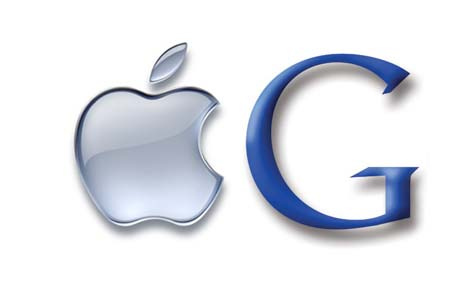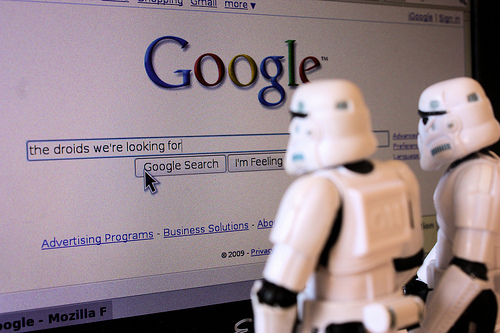For several years now, Google and Apple have been complimentary partners. Google was expertly integrated with the Apple iPhone, and the company’s engineers work tirelessly to bring many of their services to the Apple platform in addition to the PC and Linux platforms. They’ve been pals for much of the search engine’s lifespan. Google’s chief financial officer, Eric Schmidt, was even a member of Apple’s board of directors since August 2006.
And immediately after Schmidt left Apple’s boardroom this year, Google has made much more of a push into areas that have thus far been dominated by Apple and Microsoft: browsers, operating systems, music services, and now, even Google-powered phones and Google netbooks.
Schmidt’s resignation from the Apple board in 2009 was a signal to many that Google would be frequently stepping on Apple’s toes and looking to them as more of a competitor than partner. With that in mind, many can’t help but wonder which company will fare better and come out on top.

Apple has been around since 1976. Google was established in 1998. In terms of length of time in business, Apple has got Google beat by more than two decades. In terms of brand awareness, however, Google trumps Apple, coming in at No. 7 on Interbrand’s Best Global Brands List for 2009. Apple comes in at a respectable No. 20.
Google is no stranger to going up against more established competitors and coming out on top. Case in point – Microsoft. In terms of search, they’ve been battling it out, and while Microsoft’s latest incarnation of search – Bing – is doing extremely well (when it’s working), Google still has more searches, and by quite a lot. While Microsoft has an advantage in the operating system and browser markets, with the majority of computers coming pre-installed with Windows and Internet Explorer, Google’s raising some eyebrows with their Android OS and Chrome browser.
Battlefront #1: Music & OnDemand Media
When it comes to Apple, there is one thing that they’ve done that no one has been able to beat yet, and that is their Apple iTunes music store. Microsoft tried to outdo them with their Zune music store, but haven’t made much of a dent. A Google music store had been rumored about for ages, and in late October it looked like it might finally be launching. However, when Google launched their enhanced new music search, it wasn’t quite an Apple competitor.

Instead, Google’s music search function incorporated search results that you’d already be able to find online, they just made finding it easier. When you enter a music related query into the search engine, such as the name of a song, artist or album, your search results will now include links to an audio preview of those songs provided by MySpace and Lala. Clicking the link will let you listen to the audio preview directly from one of those partners.
While it may be a bummer for those expecting a Google music store to have launched, from Google’s perspective it’s a pretty smooth move. Google doesn’t have to worry about copyrights and negotiating deals with labels and artists. They simply funnel traffic to existing sources that they’ve partnered with. I assume there is a nice financial incentive for them to do so, and with this method there is the potential for profit with little risk involved.
That being said, I wouldn’t count Google out of the music business yet. They may surprise us all and keep the music card up their sleeve only to unveil it at a future date. If Google is getting into the game of selling netbooks and phones with their own operating system on it, what’s stopping them from creating their own music player and an operating system for an mp3 player? If that happened, then a music store would make more sense.
And don’t forget, with Apple, iTunes was a precursor for video downloads and rentals. Didn’t Google Video kickoff as a video micropayment marketplace? Don’t you dare think that Google has ultimately changed its overall goals in video & media sales (a direction Sony is pushng too). Can anyone say YouTube?
Battlefront #2: iPhone vs. Droid
It’s been more than a few years since the rumors first began circulating that Google was going to start making their own mobile phones. From the beginning, they’ve denied that they would get into the hardware business. So far, they’ve stuck to that – creating operating systems and programs and leaving the hardware manufacturing up to someone else.

Google’s first foray into phones powered by their operating system – Android – came in 2008 with the introduction of the G1 phone (HTC Dream) on the T-Mobile network. It was followed by the myTouch and G2 on the T-Mobile network in 2009. While it had a devoted following, Android-fever truly kicked into high gear when rumors began that Verizon Wireless would be offering a number of Android-powered devices. This fall, Verizon rolled out a few new Android phones. Now, it seems, they are poised to really take on Apple.
What Google has shown is that they are willing to give their users choice, unlike Apple :
- Google now has Android-powered devices on multiple networks, whereas Apple still has the iPhone locked in with just one carrier – AT&T.
- Google’s Android OS is open, where as the iPhone is locked down.
- Google’s app store – Android Market – also does not require approval for applications.
This is very different than the way Apple operates – they require apps to be submitted and go through an approval process, something that developers have been none too pleased about.
Android, it appears, is a real game changer. What’s especially notable about this is the fact the fact that they’ve been able to make some real headway in an area that has for years been dominated by a handful of operating systems. Symbian OS still dominates, followed by RIM (Blackberry), iPhone, and Windows Mobile. Nipping on the heels of Windows Mobile is Android, who is aggressive pursuing its two biggest competitors, Microsoft and iPhone. While Android captured just 2.8 percent of the market as of Q2 2009, it’s expected to increase with the release of the Droid phones at Verizon and the expansion in the mobile phone industry.
Droid is a Game Changer
I loved my Apple iPhone, and after I had gone through four of them, I’d had enough. Several of them were duds with various bugs rendering them impossible to deal with, and twice I a cracked the screen. AT&Ts unreliable service did not help matters either. I never upgraded to the iPhone 3G or the 3Gs.
Instead, I bravely switched over to an Android phone. I thought I’d miss my iPhone terribly, but after a week, I didn’t miss it at all and enjoyed the new freedoms that Android offered. I’ve dropped my G1 in all sorts of places, and have never experienced the heart-attack induced panic that comes with dropping an iPhone (if you’re under warranty Apple will give you a new phone for $200, if you’re not, you have to pay full price for a new one). It has a few scratches, but never once has its screen cracked. I suspect that others making the switch have had similar positive experiences.
Everything Google has launched in Desktop Search, Local, Maps, StreetView, Google Voice, FastFlip News … etc. now all makes sense as the OS of the Droid.
Battlefront #3: Internet Browsers & Operatng Systems
Apple has been in the internet browser game a bit longer than Google. Apple launched their “Safari” web browser in 2003, when it became the standard, pre-installed browser on Apple computers. In 2007, Apple launched a mobile version of the browser, as well as verions that could be run on Windows XP and Vista.
For several years, Google pushed the Mozilla Firefox browser as a better alternative to Microsoft’s Internet explorer. In December 2008, however, they publicly launched their own browser – Google Chrome. So yes, they are a few years behind Apple in the browser arena, but Google has shown the world before that it’s not a deterrent or impediment to their success.
In January 2009, Safari captured 3.62% of the browser market. In November 2009, Safari had 4.36% of the market and was the No. 3 browser behind Internet Explorer and Firefox.
In January 2009, just a month after Chrome’s release, Google managed to snag 1.52% of the market and was the No. 5 overall browser behind Internet Explorer, Firefox, Safari, and Opera. In November 2009, Chrome crawled up to the No. 4 spot with 3.93% of the market. That’s quite an impressive jump, and higher than what Safari opened up the year with. Apple has got to be nervous with gains like that. If adoption of Chrome continues at this pace, it will soon become the No. 3 overall browser.
And don’t tell me that this isn’t a build up to Mac OS vs. Chrome OS for the netbook and mobile computing market!
Who’s Winning?
Right now, Apple is ahead in all areas. BUT, I predict Google will overtake them in the areas of mobile phones and internet browsers. Apple will still be No. 1 in music, for now, but I wouldn’t count Google out of going after that more aggressively down the line as well. What are your thoughts? Please feel free to share n the comments.





